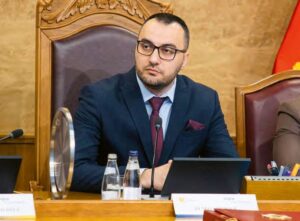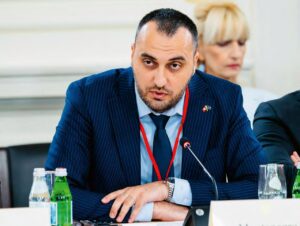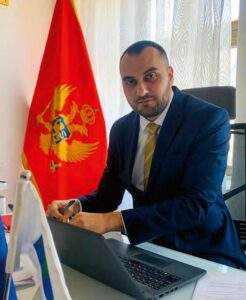Duško Stjepović, Member of the Parliament of Montenegro
Our interviewee was Duško Stjepović, a member of the Parliament of Montenegro and the Chairman of the Committee for International Relations and Emigrants.
Stjepović reveals what motivated him to enter political life, how his legal education shapes his approach to politics, and how he views the development potential of the Municipality of Danilovgrad from the perspective of a former Deputy Mayor of that municipality.
He also discussed the legislative branch’s role in the European integration process of Montenegro, as well as the importance of the diaspora for the economic and cultural development of Montenegro.

Mr. Stjepović, what motivated you to get involved in politics? Was there any particular event or person that signifi cantly infl uenced your decision to enter political life?
Although I initially decided to pursue a career in law after graduating from the Faculty of Law (and completing my internship in a law fi rm), a sequence of events afterwards led me into politics. I must admit, it wasn’t easy because politics at that time, and still today to some extent, was considered a “dirty” profession, which, with some exceptions, has often been associated with bad people.
My opinion, with a grain of salt, of the previous stereotype is that it’s true to some extent – there are all kinds of people in politics, as in any profession, anyway. However, if the good always step aside for the bad, then this stereotype about politics being a “muddy” fi eld where only similar people thrive will become a reality, and it is unlikely that it will be able to be refuted.
Besides being a lawyer – and law and politics are inextricably linked – my main motivation for engaging in this form of activism was my sense of justice, which I have exhibited from an early age, and a desire for necessary social changes. I truly believed that Montenegro and its citizens did not deserve the same unchanged government for three full decades.

You graduated from the Faculty of Law at the University of Montenegro and completed a twoyear internship at a law office. Do you believe that your legal education and experience as a lawyer help you today in shaping policies and the legislative process? How does your legal perspective influence your approach to solving political and social challenges, particularly in areas like human rights, the constitutional-legal system, and international relations?
You know, it’s incredibly hard to say where my humble self ends as a lawyer and where it begins as a politician. In fact, I tend to believe that in any proposal or initiative I approach, I do so from both sides simultaneously. Of course, my formal education and legal expertise greatly help me analyze any act I come across. Often, law and justice don’t go hand in hand, but throughout my life, and in every responsible position I’ve held or currently hold, I’ve tried to bring them as close together as possible through my actions at least. Human rights and international relations are predominantly my areas of interest, not only because these two fields represent a significant part of the International Law direction in which I specialized, but also because I believe they are key elements for achieving the goal that says: “Humanity must live in peace and justice“.
Before being elected as a member of the 28th session of the Parliament of Montenegro, you served as the Deputy Mayor of the Municipality of Danilovgrad. In that context, how do you assess the economic potential of Danilovgrad? Which industries or sectors would you highlight as crucial for further development?
It’s a long story – both regarding Danilovgrad’s potential and the situation we found in the Municipality as the most important administrative unit at the local level. In short, there is hardly any branch of the economy in which Danilovgrad couldn’t boast rich resources, especially in tourism (particularly religious tourism, with the monasteries Ostrog and Ždrebaonik attracting over a million visitors annually) and agriculture.
However, in past decades, there was a lack of ideas, something we no longer lack. There was noticeable negligence, but this has slowly and gradually started to improve. I am convinced that the current management, their love for the city and their undeniable enthusiasm for tackling accumulated challenges will achieve results that will make both us and the citizens proud.

In your opinion, what role does the legislative branch play in aligning Montenegrin laws with European standards? How can Parliament accelerate the process of European integration?
Besides the Government, which has made an immeasurable contribution to our European path, especially in terms of socio-economic measures and the fight against crime and corruption, the Parliament of Montenegro, through the adoption of a whole series of laws from the EU agenda, is an indispensable factor in Montenegro’s successful European story. I must highlight here that a number of laws have been adopted with the consensus of both the government and the opposition, which should not surprise anyone, considering that the future of our country within the European Union is a programmatic goal of all political entities in our Parliament.
Of course, some topics and the laws addressing them are of greater interest to our European partners than others. It is precisely what our parliamentary majority insists on – in close partnership and consultation with our European friends, we must focus not only on important topics but also on what they consider priorities.
The key words here are values and standards – not just for the EU or at least not primarily for the EU, but for our country and citizens’ sake.
You chair the Committee for International Relations and Emigrants in the Montenegrin Parliament. How can Montenegro better utilize the potential of its diaspora, both economically, culturally, and politically?
The diaspora is an inseparable part of Montenegro’s identity, not only because of the tangible and pragmatic things our connection with expatriates brings us economically but also because of our unwavering sense that regular contact with our people abroad strengthens patriotism and the state itself. In the upcoming period, the Ministry for the Diaspora will face a not-so-difficult task of connecting us much better with our people abroad than has been the case previously. Without discrimination and without exploiting any group for cheap political purposes.
The diaspora must be a support and a window to the world for Montenegro, not for any particular political option. Additionally, we must also consider what we can do for our diaspora, not just what they can do for us. As long as I am in the position of Chairman of the Board, I will strive to ensure this.